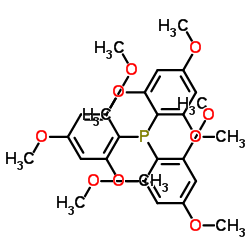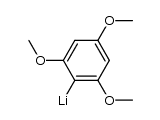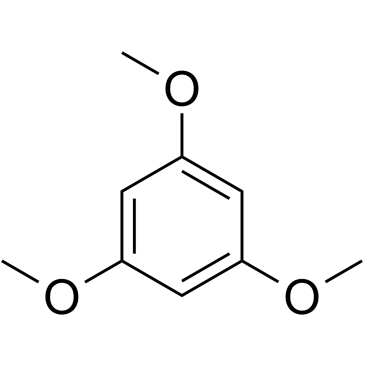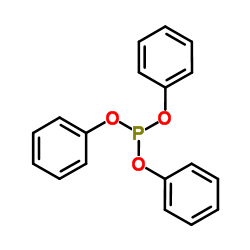Tris(2,4,6-trimethoxyphenyl)phosphine

Tris(2,4,6-trimethoxyphenyl)phosphine structure
|
Common Name | Tris(2,4,6-trimethoxyphenyl)phosphine | ||
|---|---|---|---|---|
| CAS Number | 91608-15-0 | Molecular Weight | 532.519 | |
| Density | N/A | Boiling Point | 645.5±55.0 °C at 760 mmHg | |
| Molecular Formula | C27H33O9P | Melting Point | 155-160ºC(lit.) | |
| MSDS | USA | Flash Point | 434.1±31.8 °C | |
| Name | tris(2,4,6-trimethoxyphenyl)phosphane |
|---|---|
| Synonym | More Synonyms |
| Boiling Point | 645.5±55.0 °C at 760 mmHg |
|---|---|
| Melting Point | 155-160ºC(lit.) |
| Molecular Formula | C27H33O9P |
| Molecular Weight | 532.519 |
| Flash Point | 434.1±31.8 °C |
| Exact Mass | 532.186218 |
| PSA | 96.66000 |
| LogP | 3.85 |
| Appearance of Characters | Powder | light yellow |
| Vapour Pressure | 0.0±1.8 mmHg at 25°C |
|
Section 1: Product Identification Chemical Name:Tris(2,4,6-trimethoxyphenyl)phosphine, min. 97% CAS Registry Number:91608-15-0 Formula:[(CH3O)3C6H2]3P EINECS Number:none Chemical Family:organophosphorus ligand Synonym:None
Section 2: Composition and Information on Ingredients IngredientCAS NumberPercentACGIH (TWA)OSHA (PEL) Title Compound91608-15-0100%no datano data Section 3: Hazards Identification Emergency Overview:Irritating to skin, eyes and respiratory tract. Primary Routes of Exposure:Ingestion, inhalation, skin, eyes Eye Contact:Causes slight to mild irritation of the eyes Skin Contact:Causes slight to mild irritation of the skin. Inhalation:Irritating to the nose, mucous membranes and respiratory tract. Ingestion:No information available on the physiological effects of ingestion. Acute Health Affects:Irritating to skin, eyes and respiratory tract. Chronic Health Affects:No information available on the long-terms effects of exposure. NTP:No IARC:No OSHA:No SECTION 4: First Aid Measures Immediately flush the eyes with copious amounts of water for at least 10-15 minutes. A victim may need Eye Exposure: assistance in keeping their eye lids open. Get immediate medical attention. Wash the affected area with water. Remove contaminated clothes if necessary. Seek medical assistance if Skin Exposure: irritation persists. Remove the victim to fresh air. Closely monitor the victim for signs of respiratory problems, such as difficulty Inhalation: in breathing, coughing, wheezing, or pain. In such cases seek immediate medical assistance. Seek medical attention immediately. Keep the victim calm. Give the victim water (only if conscious). Induce Ingestion: vomiting only if directed by medical personnel. SECTION 5: Fire Fighting Measures Flash Point:no data Autoignition Temperature:none Explosion Limits:none Extinguishing Medium:carbon dioxide, dry powder or foam If this material is involved in a fire, fire fighters should be equipped with a NIOSH approved positive pressure Special Fire Fighting Procedures: self-contained breathing apparatus and full protective clothing. Hazardous Combustion andIf involved in a fire this material may emit toxic organic fumes. Decomposion Products: Unusual Fire or Explosion Hazards: No unusual fire or explosion hazards. SECTION 6: Accidental Release Measures Spill and Leak Procedures:Small spills can be mixed with vermiculite or sodium carbonate and swept up. SECTION 7: Handling and Storage Store in a tightly sealed container. Keep away from heat and direct sunlight. Prolonged exposure to air may Handling and Storage: lead to the degradation of the product. SECTION 8: Exposure Controls and Personal Protection Eye Protection:Always wear approved safety glasses when handling a chemical substance in the laboratory. Skin Protection:Wear protective clothing and gloves. Ventilation:Material may form a fine dust. If possible, handle the material in an efficient fume hood. If ventilation is not available a respirator should be worn. The use of respirators requires a Respirator Respirator: Protection Program to be in compliance with 29 CFR 1910.134. Ventilation:Material may form a fine dust. If possible, handle the material in an efficient fume hood. Additional Protection:No additional protection required. SECTION 9: Physical and Chemical Properties Color and Form:light yellow pwdr. Molecular Weight:532.54 Melting Point:155-160° Boiling Point:no data Vapor Pressure:no data Specific Gravity:no data Odor:none Solubility in Water:Insoluble SECTION 10: Stability and Reactivity Stability:air sensitive solid Hazardous Polymerization:no hazardous polymerization Conditions to Avoid:prolonged contact with air Incompatibility:Oxidizing agents and halogens Decomposition Products:carbon dioxide, carbon monoxide, phosphorus pentoxide, and organic fumes. SECTION 11: Toxicological Information RTECS Data:No information available in the RTECS files. Carcinogenic Effects:No data available Mutagenic Effects:No data available Tetratogenic Effects:No data available SECTION 12: Ecological Information Ecological Information:No information available SECTION 13: Disposal Considerations Disposal:Dispose of according to local, state and federal regulations. SECTION 14: Transportation Shipping Name (CFR):Non-hazardous Hazard Class (CFR):NA Additional Hazard Class (CFR):NA Packaging Group (CFR):NA UN ID Number (CFR):NA Shipping Name (IATA):Non-hazardous Hazard Class (IATA):NA Additional Hazard Class (IATA):NA Packaging Group (IATA):NA UN ID Number (IATA):NA SECTION 15: Regulatory Information TSCA:Not listed in the TSCA inventory. SARA (Title 313):Title compound not listed. Second Ingredient:none SECTION 16 - ADDITIONAL INFORMATION N/A |
| Personal Protective Equipment | Eyeshields;Gloves;type N95 (US);type P1 (EN143) respirator filter |
|---|---|
| RIDADR | NONH for all modes of transport |
| WGK Germany | 3 |
|
~72% 
Tris(2,4,6-trim... CAS#:91608-15-0 |
| Literature: Wada, Masanori; Hidashizaki, Shogo Journal of the Chemical Society, Chemical Communications, 1984 , # 7 p. 482 - 483 |
|
~% 
Tris(2,4,6-trim... CAS#:91608-15-0 |
| Literature: Meditsinskaya Promyshlennost SSSR, , vol. 13, # 12 p. 5,10 Chem.Abstr., , p. 10914 |
|
~% 
Tris(2,4,6-trim... CAS#:91608-15-0 |
| Literature: Journal of the Chemical Society, Dalton Transactions: Inorganic Chemistry (1972-1999), , # 8 p. 1341 - 1348 |
| Precursor 3 | |
|---|---|
| DownStream 0 | |
|
J. Chem. Soc. Chem. Commun. , 482, (1984)
|
| P[2,4,6-(OMe)3C6H2]3 |
| tri(2,4,6-trismethoxyphenyl)phosphine |
| P[2,4,6-(MeO)2C6H2]3 |
| MFCD00145467 |
| Phosphine, tris(2,4,6-trimethoxyphenyl)- |
| TTMPP |
| Phosphine,tris(2,4,6-trimethoxyphenyl) |
| tris(2,4,6-trimethoxylphenyl)phoshpine |
| Tris(2,4,6-trimethoxyphenyl)phosphine |
| (2,4,6-tri-OMe-Ph)3P |




